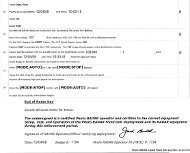4/30/2010
Maryland Speed Camera Program Faces New Legal ChallengeSpeed camera tickets issued on the weekend in Maryland may be thrown out in court over a lack of calibration.

Vehicle owners ticketed by Maryland speed cameras may find relief after one motorist earlier this month discovered how to beat the system. Peggy Lucero began her legal battle after Affiliated Computer Services accused her of speeding in Gaithersburg on Saturday, November 21, 2009. She did not believe the citation was accurate.
"I was alleged to have been driving 45 MPH," Lucero told TheNewspaper. "I have been driving for over four decades and never have received a speeding ticket -- by a human or by a camera -- on the East or West coasts where I have lived. I called up the city of Gaithersburg police and asked a few questions about the camera. A few days later I had more questions and called and asked further questions. I wasn't receiving consistent answers, and this began to trouble me."
Lucero's questioning uncovered a goldmine of information. She had been flashed on MD 355, a six-lane highway with a posted limit of 30 MPH. Lucero asked the State Highway Administration (SHA) for the engineering justification of the speed limit, and officials realized no speed study had been performed in the past five years -- even though federal guidelines recommend engineering studies be performed before the use of photo enforcement. SHA completed a study in January and found that the speed limit should have actually been set at 40 MPH, especially since photo radar was being used.
"Given the data and information below, we do not believe that the existing 30 MPH speed limit is appropriate," SHA District 3 traffic engineer Andrew Bossi wrote to the city in March. "Observations of the [speed] camera's impacts to traffic noted that motorists would brake significantly at each camera location, followed by accelerating immediately afterwards. This effect was most pronounced at the southbound camera, where motorists were observed frequently bunching together at the camera position. Given the recent installation of the cameras, quantifiable safety data is not yet available; but the current conditions may pose a more significant risk for rear-end and sideswipe conditions and, with speeds increasing immediately beyond the cameras, may not be achieving the desired safety benefits."
Gaithersburg officials ignored the safety warning and insisted that the speed limits in the area where cameras can be used be lowered, not raised.
"At the meeting our mayor and city council were unanimous in the desire to not raise the 30 MPH speed limit in this area and, in fact, have requested that the existing 30 MPH speed limit that now begins at Education Boulevard be extended an additional 750 feet to the south, to Central Avenue," Gaithersburg Public Works Engineering Services Director Ollie K. Mumpower wrote in an April 7 email. "Both Public Works and the police department support the council request."
Lucero's next step was to review state law, where she noticed a provision requiring that the "speed monitoring system operator" maintain a "daily log" proving that the system has been properly calibrated. She asked for the November 21 log, but Gaithersburg only supplied the logs for the preceding Friday and following Monday. As she later learned, the individual performing the so-called calibrations did not work weekends. After a number of delays, Lucero took her evidence before District Court Judge J. Michael Conroy on April 12.
"The validity of the ticket depends on a daily calibration testing of the camera unit," Lucero argued. "I believe the evidence in my case, the citation, was illegally obtained. The camera images were obtained illegally because the camera was not operated in accordance with state law."
Judge Conroy found her not guilty, placing Lucero in the most rarefied of company. According to Montgomery County documents, 742,470 speed camera tickets were issued between fiscal 2007 and 2009. Of these, only ten were found not guilty. Lucero hopes others will be inspired to challenge tickets issued by the system in violation of state law.
Sample calibration logs are available in a 850k PDF file at the source link below.


